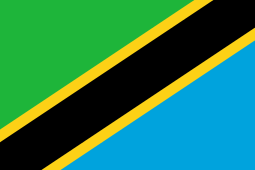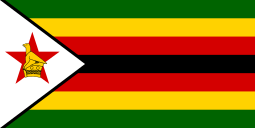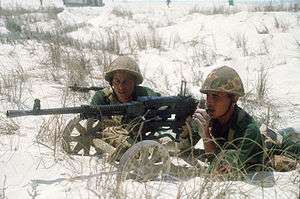SG-43 Goryunov
| SG-43 | |
|---|---|
|
Egyptian marines with SG-43, 1985 | |
| Type | Medium machine gun |
| Place of origin | Soviet Union |
| Service history | |
| In service | 1943–1968 (Soviet Union) |
| Wars | World War II, Korean War, Vietnam War, Lebanese Civil War, Soviet War in Afghanistan, War in Afghanistan, Syrian Civil War |
| Production history | |
| Designer | P.M. Goryunov |
| Designed | 1940–1943[1] |
| Variants | SG-43, SGM, SGMT, SGMB |
| Specifications | |
| Weight |
13.8 kg (30.42 lb) gun body 41 kg (90.39 lb) on wheeled mount |
| Length | 1,150 mm (45.3 in) |
| Barrel length | 720 mm (28.3 in) |
|
| |
| Cartridge | 7.62×54mmR |
| Action | Gas-operated |
| Rate of fire | 500–700 rounds/min |
| Muzzle velocity | 800 m/s (2,624 ft/s) |
| Effective firing range | 1100 m (1200 yd) |
| Maximum firing range | 1500 meters [2] |
| Feed system | 200 or 250 round belts |
| Sights | Iron sights |
The SG-43 Goryunov [ Russian: Смонтированный пулемет системы Горюнова (Smontirovannyy pulemet sistemi Goryunova > "Mounted machinegun, Goryunov design")] was a Soviet medium machine gun that was introduced during the Second World War. It was chambered for the 7.62×54mmR cartridge, and was introduced in 1943 as a replacement for the older M1910 Maxim machine guns. It was mounted on wheeled mounts, tripods and armored vehicles.
The SG-43 used a tilting breechblock, moving sideways and locking into the side of the receiver. The feed is not straightforward, as the gun fires the 7.62×54mmR round, and this has to be withdrawn rearwards from the belt before ramming into the breech. The reciprocating motion is achieved by using two claws to pull the round from the belt, and then an arm pushes the round into the cartridge guide ready for the bolt to carry it to the breech. Despite this complication, the SG-43 was remarkably reliable and feed jams were apparently few.
The barrel is air-cooled and massively dense, contributing to a fairly high overall weight. The bore is chromium-plated and able to withstand continuous fire for long periods. The barrel can also be easily changed by releasing a simple lock, and the carrying handle allows a hot barrel to be lifted clear without difficulty. The World War II version of the gun had a smooth outline to the barrel, and the cocking handle was under the receiver, with no dust covers to the feed and ejection ports.
After the end of World War II, the SG-43 was improved and renamed SGM ("M" for modernized); dust covers and a new barrel lock were fitted, and a splined barrel was fitted to improve cooling.[3] A coaxially-mounted stockless electric solenoid-fired variant was developed under the designation SGMT (the "T" standing for Tankovy, or "Tank").
The SG-43/SGM was widely exported and also licensed for construction in several countries. It was manufactured in the People's Republic of China respectively as the Type 53 (SG-43) and Type 57 (SGMB) heavy machine guns. It was also produced in Czechoslovakia (as Vz 43) and Poland (as Wz 43).[4]
In addition to World War II, it saw service in the Korean War with the Communist North Korean and Chinese forces. In Soviet service, the Goryunov, together with the RP-46, was replaced in the 1960s by the PK machine gun due to the switch in Soviet tactical doctrine to the general-purpose machine gun concept, rendering the gun effectively obsolete.
Operators
.svg.png) Afghanistan: used by DRA during the Soviet Afghan War[5]
Afghanistan: used by DRA during the Soviet Afghan War[5].svg.png) Albania
Albania China[6]
China[6] Cuba
Cuba Cyprus
Cyprus Egypt: built under license [7]
Egypt: built under license [7] Finland: used during World War II in limited numbers [8]
Finland: used during World War II in limited numbers [8].svg.png) Hungary: SG-43 and KGK variant[9]
Hungary: SG-43 and KGK variant[9] Indonesia: used by Mobile Indonesian Police Brigade (BRIMOB)
Indonesia: used by Mobile Indonesian Police Brigade (BRIMOB) Iran: SGM variant.
Iran: SGM variant. Mongolia
Mongolia North Korea: used during the Korean War.[2]
North Korea: used during the Korean War.[2]-
 North Vietnam used during the Vietnam war by the Nva and Vietcong [10]
North Vietnam used during the Vietnam war by the Nva and Vietcong [10]  Syria: limited use by Syrian Arab Army.
Syria: limited use by Syrian Arab Army. Soviet Union: In 1969 the SG-43 was replaced by the PKM.[6]
Soviet Union: In 1969 the SG-43 was replaced by the PKM.[6]-
 Tanzania[11]
Tanzania[11]  Zimbabwe[12]
Zimbabwe[12]
See also
References
- ↑ Советская военная энциклопедия. / ред. Н.В. Огарков. том 2. М., Воениздат, 1976. стр.617
- 1 2 Edwards, Paul M. (2006). The Korean War. Westport, CT: Greenwood Press. p. 77. ISBN 0-313-33248-7.
- ↑
- ↑ Small Arms Identification and Operation Guide--Eurasian Communist Countries, Defense Intelligence Agency/United States Army Materiel Command ST-HB-07-03-74, p. 324
- ↑ Wright, Lawrence, The Looming Tower, Vintage Books (2006), ISBN 978-1-4000-3084-2, p. 134
- 1 2 Gorjunov SG-43 and SGM (USSR / Russia) world.guns.ru
- ↑ Laffin, John (1982). Arab armies of the Middle East wars, 1948-73 (Illustrated ed.). Osprey Publishing. p. 15. ISBN 0-85045-451-4.
- ↑ Jowett, Philip (2006). Finland at War 1939-45 (Illustrated ed.). Osprey Publishing. p. 50. ISBN 1-84176-969-X.
- ↑ Lugosi, József (2008). "Gyalogsági fegyverek 1868–2008". In Lugosi, József; Markó, György. Hazánk dicsőségére: 160 éves a Magyar Honvédség. Budapest: Zrínyi Kiadó. p. 383. ISBN 978-963-327-461-3.
- ↑ http://www.nam-valka.cz/zbrane/sg-43.html
- ↑ https://sites.google.com/site/worldinventory/https-sites-google-com-site-worldinventory-wiw_af_tanzania
- ↑ Headquarters 1 Brigade (Brady Barracks) (Gate Exhibit), Bulawayo, Zimbabwe: Zimbabwe National Army, 2010
External links
| Wikimedia Commons has media related to SG-43 Goryunov. |
- Goryunov SG-43 and SGM
- 7.62mm Goryunov Heavy Machine Gun
- 7.62mm Goryunov Heavy Machine Gun, SG43 – Walk around photos
